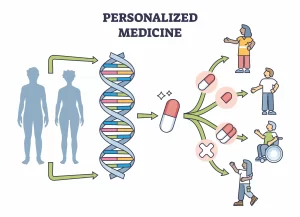In the contemporary landscape of healthcare, the integration of Artificial Intelligence (AI) stands as a transformative force, reshaping various facets of medical practice. Its incorporation into pharmacy practice has led to significant advancements, revolutionizing the way medications are dispensed, managed, and optimized for patient care. The profound impact of AI in pharmacy practice spans from enhancing efficiency in drug development to optimizing medication therapy and improving patient outcomes.
Enhanced Drug Discovery and Development

AI has accelerated the drug discovery process, revolutionizing the way new medications are researched and developed. Through machine learning algorithms and predictive analytics, AI assists researchers in analyzing vast amounts of data, identifying potential drug candidates, and predicting their effectiveness. This has significantly reduced the time and cost involved in drug discovery, expediting the translation of discoveries from the laboratory to clinical trials.
Precision Medicine and Personalized Therapies

One of the remarkable contributions of AI in pharmacy practice is its role in advancing precision medicine. AI algorithms analyze genetic and molecular data to identify personalized treatment options tailored to an individual’s unique genetic makeup and health characteristics. This personalized approach ensures that medications are optimized for efficacy while minimizing adverse effects, marking a shift towards more targeted and effective therapies.
Medication Management and Optimization

In clinical pharmacy settings, AI-powered tools and systems play a pivotal role in medication management and optimization. AI algorithms analyze patient data, including medical history, lab results, and medication records, to generate insights into optimal drug dosages, potential drug interactions, and individualized treatment plans. Pharmacists use these insights to make informed decisions, ensuring safe and effective medication regimens for patients.
Predictive Analytics for Patient Outcomes

AI-driven predictive analytics have proven instrumental in forecasting patient outcomes based on various factors such as medication adherence, lifestyle choices, and disease progression. By analyzing vast datasets, AI algorithms can predict potential health complications, anticipate disease exacerbations, and recommend proactive interventions. This enables pharmacists to provide timely interventions, potentially preventing adverse health events and improving patient outcomes.
Automation and Operational Efficiency

AI-powered automation systems have streamlined pharmacy operations, enhancing efficiency and accuracy in medication dispensing and inventory management. Automated systems utilize AI algorithms to fill prescriptions, detect errors, and manage inventory levels, reducing human error and mitigating the risk of medication discrepancies. This not only saves time but also ensures precision in medication dispensation.
Challenges and Ethical Considerations

Despite its immense potential, the integration of AI in pharmacy practice is not without challenges. Privacy concerns, data security, and the ethical use of patient information remain significant considerations. Ensuring the confidentiality of patient data and complying with regulations is crucial in maintaining trust and safeguarding patient privacy.
Additionally, there is a need for ongoing training and education for pharmacists to effectively utilize AI technologies. Integrating these tools seamlessly into practice requires a thorough understanding of AI capabilities, data interpretation, and the ethical implications of AI-driven decision-making in patient care.
Future Prospects and Conclusion
The future of AI in pharmacy practice holds promising prospects for further advancements. As AI technology continues to evolve, its applications in drug discovery, personalized medicine, and patient care are expected to expand. Advancements in natural language processing and AI-driven chatbots may also enhance patient counseling and medication adherence through personalized communication.
In conclusion, AI stands as a catalyst for transformation in pharmacy practice, offering unprecedented opportunities to revolutionize patient care. Its integration empowers pharmacists to optimize medication management, personalize therapies, and predict patient outcomes, ultimately improving the quality, safety, and efficiency of healthcare delivery. As the healthcare landscape evolves, the synergy between AI and pharmacy practice will undoubtedly continue to redefine standards of care, shaping a more efficient, precise, and patient-centered healthcare system.



